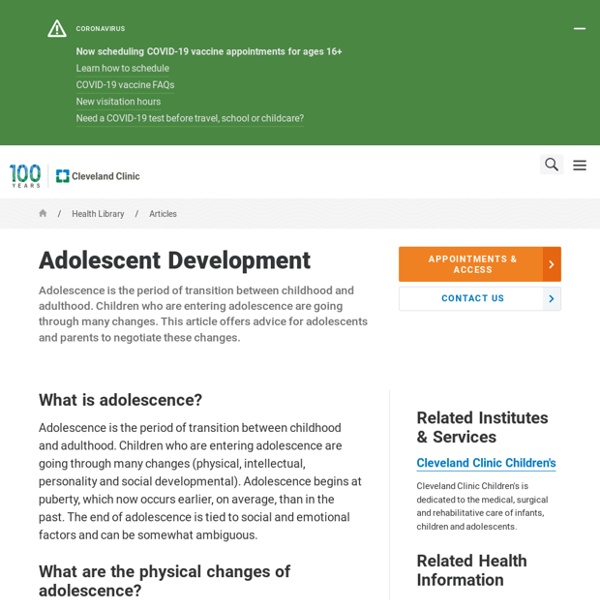Gender Identity in Adolescent Development
Gender Identity Andi isn't alone in what she's going through. As children turn into adolescents, they begin to question what it means to be part of their gender, and some adolescents find that their gender and their sex organs don't match up, as with Andi. One of the first stages of gender development in adolescence involves establishing gender identity, or what it means to be part of each gender. For example, Andi developed the idea that a man is tough and likes cars and sports. In early adolescence, people tend to be very rigid about gender roles.
Adolescent Development
Overview During adolescence, young people experience many changes as they transition from childhood into young adulthood. These changes include physical, behavioral, cognitive, and emotional-social development. Public health professionals who work with adolescents need substantive information about the trajectory of young people's lives during all phases of adolescent development.
Adolescent Identity Development: What to Expect in Teens
Adolescent Identity Development: The Factors of Change Among the profound and exciting changes taking place in adolescence is the process of self-discovery. Our teens are working to figure out who they are, making adolescent identity development a central feature of teen life. Young people’s identities are shaped by lots of factors — family, cultural and societal expectations, experiences with institutions like school and the media, and friends.
Stages of Adolescence
By: Brittany Allen, MD, FAAP & Helen Waterman, DO Adolescence is the period of transition between childhood and adulthood. It includes some big changes—to the body, and to the way a young person relates to the world. The many physical, sexual, cognitive, social, and emotional changes that happen during this time can bring anticipation and anxiety for both children and their families. Understanding what to expect at different stages can promote healthy development throughout adolescence and into early adulthood.
How to Support Your Teen’s Identity
The main developmental task for young people is to figure out who they are and where they fit in in the world. Teenagers are learning how to be an adult and this transition can include becoming more independent, looking for new experiences, developing their values and exploring sexual identity and romantic relationships. While teenagers do rely heavily on peer approval, their parents’ opinions still carry weight well into adulthood.
Adolescent Identity Development - Adolescence - ACT for Youth
The development of a strong and stable sense of self is widely considered to be one of the central tasks of adolescence [1]. Despite the fact that identity development occurs throughout one's lifetime, adolescence is the first time that individuals begin to think about how our identity may affect our lives [2]. During adolescence, we are much more self-conscious about our changing identities than at any other stage in our lives [3]. Visit Toolkit: Identity Development for resources.
Erik Erikson's Stages of Psychosocial Development
Erik Erikson was an ego psychologist who developed one of the most popular and influential theories of development. While his theory was impacted by psychoanalyst Sigmund Freud's work, Erikson's theory centered on psychosocial development rather than psychosexual development. The stages that make up his theory are as follows:1 Let's take a closer look at the background and different stages that make up Erikson's psychosocial theory. Overview So what exactly did Erikson's theory of psychosocial development entail?
Y Studios — What Factors Really Influence Identity?
What factors influence identity formation? In a sense, every stimulus we experience consciously and subconsciously throughout our lives has an impact on the way we and society create and label our identities. Identity formation and evolution are impacted by a variety of internal and external factors like society, family, loved ones, ethnicity, race, culture, location, opportunities, media, interests, appearance, self-expression and life experiences. 1. Society
What Is Self-Concept and How Does It Form?
Self-concept is the image that we have of ourselves. How exactly does this self-image form and change over time? This image develops in a number of ways but is particularly influenced by our interactions with important people in our lives. What Is Self-Concept? Self-concept is how you perceive your behavior, abilities, and unique characteristics.1 For example, beliefs such as "I am a good friend" or "I am a kind person" are part of an overall self-concept.




Teenagers begin to undergo puberty and experience diverse changes. These changes can range from physical (growing in size and height) to emotional (activation of sexual hormones), as well as cognitive (becoming more self-conscious and engaging in arguments). by tzx1 Apr 15
this phase of growing up includes drastic physical and emotional changes. by georgelee94 Sep 22